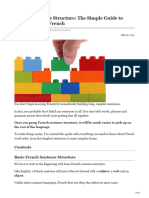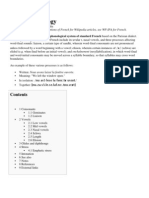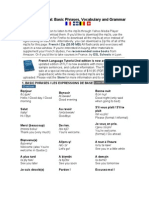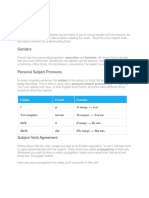French Pronunciation Guide
French Pronunciation Guide
Uploaded by
lethanhvan186Copyright:
Available Formats
French Pronunciation Guide
French Pronunciation Guide
Uploaded by
lethanhvan186Copyright
Available Formats
Share this document
Did you find this document useful?
Is this content inappropriate?
Copyright:
Available Formats
French Pronunciation Guide
French Pronunciation Guide
Uploaded by
lethanhvan186Copyright:
Available Formats
Basic French pronunciation rules
Here we do not intend to list all French pronunciation rules, we collected only those rules which are significantly different to English ones and therefore when you use Easy-to-Learn French Phrases they can be very helpful to understand why "this word" is pronounced "this way". 1. Stress in French words always falls on the last pronounced syllable 2. The final letter "e" is normally not pronounced, the preceding consonant is pronounced. 3. Final consonants are usually silent , except of "c", "f" and "l" which are generally pronounced. As in English, in plural most French words add an "s", however, the last "s" in a word is not pronounced. Example: enfant and its plural form enfants are pronounced the same way. There are exceptions like fils, gaz, ouest, sud, autobus and others. See also liaison rules when some final consonants become sounded. 4. "" is always pronounced as /s/ (Garon, leon, faon) 5. Letter "h" is never pronounced 6. Liaison rules: when a French word ends with a consonant and the next begins with a vowel or a silent "h" the final consonant joins the following vowel to form a complete syllable. The pronunciation in this situation can be different: consonants "s" and "x" are pronounced as /z/ (lesenfants, deuxenfants), "f" is pronounced as /v/, "d" as /t/. 7. Elision rules: French letters "a" and "e" in the words le, la, ce, je, me, te, se, de, ne, que is dropped when the word that follows them begins with a vowel or silent "h". (l'enfant) 8. Nasal sounds. They are indicated by vowel + "n" or "m", where vowel becomes nasal and "n" or "m" is not pronounced. Please note that only when used alone (such as in words un, en, ton) or followed by a consonant (except another "n" or "m"), vowels together with "n" or "m" will form a nasal sound. If a consonant is followed by a vowel, both vowel and consonant will be pronounced (une) 9. There are six masculine French adjectives and three feminine possessive adjectives that change their formif they precede a word beginning with a vowel or silent "h". beau - bel (beautiful) (un beau garon - un bel homme) ce - cet (this, that) (ce garon - cet enfant) fou - fol (mad) (un fou rire - un fol espoir, un fol appel) mou - mol (soft) (un mou matelas - un mol oreiller) nouveau - nouvel (new) (le Nouveau Monde - le Nouvel An) vieux - vieil (old) (un vieux camarade - un vieil ami) French feminine possessive adjectives ma, ta, sa (my, your, her) change to the masculine form mon, ton, son (ma maison - mon cole; ta vie - ton exprience; sa vie - son uvre)
You might also like
- French Sentence StructureDocument13 pagesFrench Sentence Structurevijayshetty sNo ratings yet
- FrenchDocument3 pagesFrenchMekhmanNo ratings yet
- Pronounce It Perfectly in FrenchDocument90 pagesPronounce It Perfectly in FrenchHoài Lâm Của Vịt89% (9)
- French For Beginners - The Best Handbook For Learning To Speak French PDFDocument101 pagesFrench For Beginners - The Best Handbook For Learning To Speak French PDFsudhakara.rr359100% (7)
- French Accents List: The 5 French Accent MarksDocument7 pagesFrench Accents List: The 5 French Accent Marksmuskaan100% (1)
- Lesson The Alphabet: French (Français) Here's A Tip From Native French SpeakersDocument3 pagesLesson The Alphabet: French (Français) Here's A Tip From Native French SpeakersShe QuintosNo ratings yet
- Contacts French Grammar Reading PlanDocument3 pagesContacts French Grammar Reading PlaneduauNo ratings yet
- 100 French WordsDocument102 pages100 French WordsomeedjanNo ratings yet
- French TempsDocument122 pagesFrench TempsSladjana SamardzicNo ratings yet
- French Unit On Family - 6 LessonsDocument8 pagesFrench Unit On Family - 6 Lessonsapi-325554448100% (1)
- AFA - Valve Feature & CharacteristicsDocument6 pagesAFA - Valve Feature & Characteristicslethanhvan186No ratings yet
- French PhonologyDocument14 pagesFrench PhonologysrinuthenameNo ratings yet
- French Pronunciation For Speakers of American English: Vowels in ContrastDocument8 pagesFrench Pronunciation For Speakers of American English: Vowels in ContrastVivek AgarwalNo ratings yet
- PronunciationDocument14 pagesPronunciationana_amyNo ratings yet
- French ER Verbs and Conjugations E BookDocument29 pagesFrench ER Verbs and Conjugations E BookfatemaNo ratings yet
- 141 FrenchDocument31 pages141 FrenchFoxelt ManingNo ratings yet
- French Pronunciation PracticeDocument9 pagesFrench Pronunciation PracticeMr AlixNo ratings yet
- French I TutorialDocument22 pagesFrench I TutorialNabendu LodhNo ratings yet
- Tips and Notes: JJJJJDocument55 pagesTips and Notes: JJJJJAnifa100% (1)
- DuolingoDocument174 pagesDuolingojoshua_chanNo ratings yet
- French PhoneticDocument11 pagesFrench PhoneticDinhThuy100% (1)
- French - Lecon01 NotesDocument3 pagesFrench - Lecon01 Notesyulidong2000No ratings yet
- Passe Compose With AvoirDocument3 pagesPasse Compose With Avoirapi-173610472No ratings yet
- Introduction To Verbs in FrenchDocument8 pagesIntroduction To Verbs in FrenchJudy Ann ViolantaNo ratings yet
- French Alphabet PDFDocument10 pagesFrench Alphabet PDFNguyễn NgaNo ratings yet
- French PronunciationDocument4 pagesFrench PronunciationMd. Makhjanul Islam Tauhid100% (1)
- Gerund or - Ing FormDocument1 pageGerund or - Ing FormKristen HammerNo ratings yet
- The Three French Verb Groups and The Present TenseDocument6 pagesThe Three French Verb Groups and The Present TenseSamira Yağlıca100% (2)
- French ListDocument6 pagesFrench ListAnonymous hCZEayNo ratings yet
- Simple French WordsDocument47 pagesSimple French Wordsjakshi100% (1)
- Le Passé Composé en Français Pour DébutantsDocument4 pagesLe Passé Composé en Français Pour DébutantsFavoured RoyalNo ratings yet
- Beginning French PronunciationDocument16 pagesBeginning French PronunciationLakshmi Narayanan100% (2)
- A Guide To French 400 Bad Request Nginx/1.2.9Document9 pagesA Guide To French 400 Bad Request Nginx/1.2.9mohsen_sm62No ratings yet
- 05 - Interrogative Adjectives-DeterminersDocument3 pages05 - Interrogative Adjectives-DeterminersVajresh N.No ratings yet
- French NegativesDocument3 pagesFrench Negativesenglishspeakingdude0% (1)
- Time in FrenchDocument20 pagesTime in FrenchMOHANALAKSHMI MNo ratings yet
- Introduction To French VerbsDocument4 pagesIntroduction To French VerbsR JayammaNo ratings yet
- French Prepositions With Countries Continents US StatesDocument13 pagesFrench Prepositions With Countries Continents US StatesTeluguvilan HaHaNo ratings yet
- French Essentials (Free)Document45 pagesFrench Essentials (Free)Mahmudur RahmanNo ratings yet
- French IDocument22 pagesFrench IFumie Ong 王瑛瑶No ratings yet
- French Tutorial Basic Phrases, Vocabulary and Grammar: BabelfishDocument22 pagesFrench Tutorial Basic Phrases, Vocabulary and Grammar: BabelfishGeorgy ApreuteseiNo ratings yet
- French Grammar Study Plan - Beginner To AdvancedDocument11 pagesFrench Grammar Study Plan - Beginner To AdvancediampamugoNo ratings yet
- Modules 2the FrenchDocument95 pagesModules 2the Frenchkhailyn3rdyearNo ratings yet
- Avoir - To Have: Have A French VerbDocument3 pagesAvoir - To Have: Have A French VerbSamira YağlıcaNo ratings yet
- Mon Enfance Project Rubric Checklist 2017Document2 pagesMon Enfance Project Rubric Checklist 2017api-261181520No ratings yet
- GCSE BookletDocument70 pagesGCSE Bookletamali23No ratings yet
- French ArticlesDocument2 pagesFrench Articlesapi-299513272No ratings yet
- Apprendre To Learn in 10 Main French TensesDocument4 pagesApprendre To Learn in 10 Main French TensesCarl Anthony FabicNo ratings yet
- Voir To See in 10 Main French TensesDocument4 pagesVoir To See in 10 Main French TensesCarl Anthony FabicNo ratings yet
- 04 - Demonstrative Adjectives-DeterminersDocument3 pages04 - Demonstrative Adjectives-DeterminersVajresh N.No ratings yet
- French Level 2 NotesDocument3 pagesFrench Level 2 NotesPeewee ReyNo ratings yet
- Excellent French Pronouns and Prepositions-BookDocument31 pagesExcellent French Pronouns and Prepositions-BookChandaKundaNo ratings yet
- French Alphabet PDFDocument1 pageFrench Alphabet PDFsalumu christineNo ratings yet
- Direct and Indirect Object PronounsDocument11 pagesDirect and Indirect Object PronounsHamish HaldaneNo ratings yet
- French Definite Articles (Articles Définis)Document2 pagesFrench Definite Articles (Articles Définis)Neelma MisraNo ratings yet
- French Exercises: Comment Allez-Vous ? The Personal Pronoun Vous Corresponds To The 2Document7 pagesFrench Exercises: Comment Allez-Vous ? The Personal Pronoun Vous Corresponds To The 2Jenny JenNo ratings yet
- Conversation in FrenchDocument47 pagesConversation in FrenchDavidNo ratings yet
- French Charts PDFDocument7 pagesFrench Charts PDFAlina EmNo ratings yet
- French 2 WFD10201: Me You Him / Her / One Us You ThemDocument2 pagesFrench 2 WFD10201: Me You Him / Her / One Us You ThemEmyza Amirah100% (1)
- Gramaire Francias Et AnglaisDocument52 pagesGramaire Francias Et AnglaisStamen YovchevNo ratings yet
- French PronunciationDocument13 pagesFrench Pronunciationxtreme2002100% (3)
- Franc A IsDocument33 pagesFranc A IsRajarshi DattaNo ratings yet
- Understanding FrenchDocument108 pagesUnderstanding FrenchnaxodownloadNo ratings yet
- DriPak 2000 PDFDocument2 pagesDriPak 2000 PDFlethanhvan186No ratings yet
- Determining Your Optimal Storage Density PDFDocument2 pagesDetermining Your Optimal Storage Density PDFlethanhvan186No ratings yet
- 10 Steps To An Efficient Warehouse PDFDocument22 pages10 Steps To An Efficient Warehouse PDFlethanhvan186No ratings yet
- Sheraton Hanoi: The Green HotelDocument23 pagesSheraton Hanoi: The Green Hotellethanhvan186No ratings yet
- HSE Guidance Refrigeration and Halon ManagementDocument2 pagesHSE Guidance Refrigeration and Halon Managementlethanhvan186No ratings yet
- IP-20 - Ventilation Rates in Offices - Mechanical and NaturalDocument9 pagesIP-20 - Ventilation Rates in Offices - Mechanical and NaturalKadiri OlanrewajuNo ratings yet
- French Pronunciation GuideDocument15 pagesFrench Pronunciation GuideRaunak Sharma100% (1)
- French Phonology - Wikipedia, The Free EncyclopediaDocument14 pagesFrench Phonology - Wikipedia, The Free EncyclopediaJafar FikratNo ratings yet
- 8Y981INV2215 DjvuDocument133 pages8Y981INV2215 Djvuperji9No ratings yet
- An Introduction To French PronunciationDocument185 pagesAn Introduction To French Pronunciationbycsx100% (3)
- Current Issues in French Phonology-Liaison and Position TheoriesDocument15 pagesCurrent Issues in French Phonology-Liaison and Position TheoriesOpa YatNo ratings yet
- French Pronunciation GuideDocument1 pageFrench Pronunciation Guidelethanhvan186No ratings yet
- JAKOBSON, R. LOTZ, J - Notes On The French Phonemic PatternDocument9 pagesJAKOBSON, R. LOTZ, J - Notes On The French Phonemic PatternGabriel LimaNo ratings yet
- French Hacking The French Alphabet Numbers Learn French ForDocument127 pagesFrench Hacking The French Alphabet Numbers Learn French ForAnca VasileNo ratings yet
- Second Middle English Primer - Extracts From ChaucerDocument136 pagesSecond Middle English Primer - Extracts From ChaucerRaphael Dias BarcellosNo ratings yet














































































